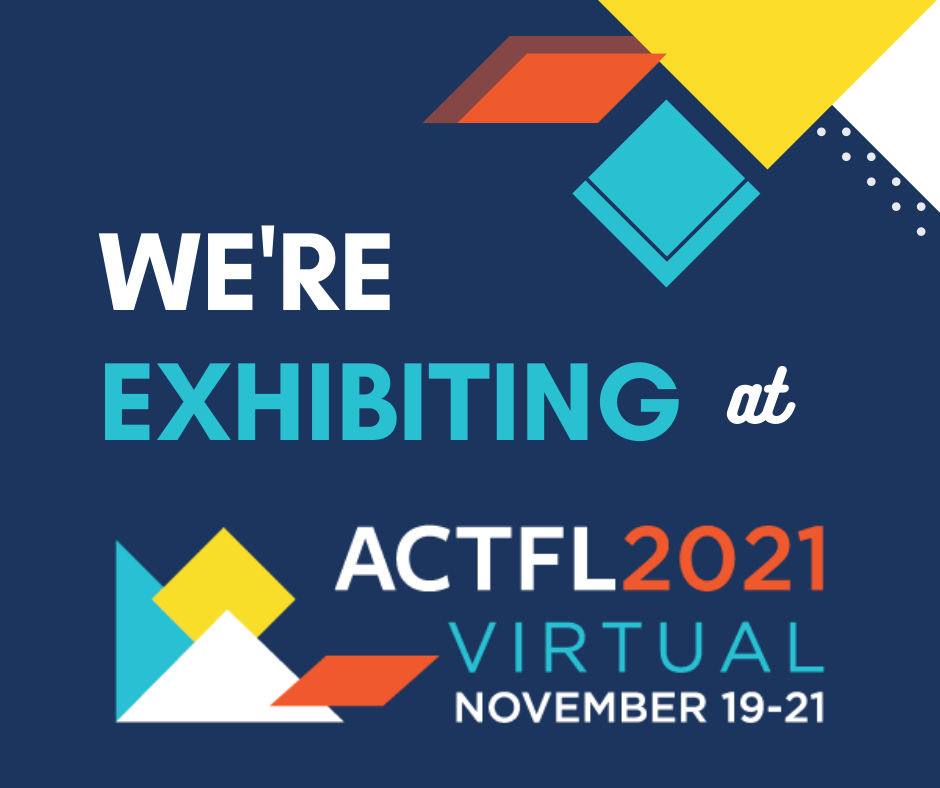Here’s today’s tool tip: Attend ACTFL’s Annual Convention to tune into best practices for WL teaching!
If you have been following this series of blogs about what I learned in my 43 years of teaching a world language, I will defer my discussion of differentiation in the classroom to next week and direct all your attention to ACTFL for now; its virtual conference opens this Thursday, November 18.
If you have never attended, it is time to prioritize this premier conference for world language teachers. Don’t miss the unimaginable passion and expertise of these four days.
Many leaders in our field gather and share their expertise about what constitutes best practices for world language teaching. Throughout my career, I have been privileged to have learned from some of the best like Helena Curtain, Greg Duncan, and Katrina Griffin.
Helena Curtain, a fellow Wisconsinite and co-author of Language and Children: Making the Match, a guide to communicative language teaching based on second language acquisition theory, was the first to shed incredible light on theory-based strategies for teaching K-8 students when I was developing a pilot elementary program in the ’80s.
Her encouragement, well-researched pedagogy, and her annual FLESFest were pivotal in helping me to create a very successful program for young language learners that is still going strong today. Many years later, I had the advantage of learning from Helena’s expertise again when she helped our Upper School WL department begin to understand the five C’s of the ACTFL World-Readiness Standards (Communication, Connection, Culture, Comparison, and Communities), taught us the concept of thematic teaching, and encouraged us to create more communicative activities to get our students up and talking in every class.
It was hard for all of us in the WL department at the best private school in Wisconsin to hear that we could be better; however, it is that very humility that we all need to stay current with best practices!
Several years later, with new leadership in our department, we decided to revisit some of the principles of best practices in language teaching that we had learned from Helena. This time we delved into the ACTFL Performance Descriptors with Greg Duncan, another expert in the field. As a result of his guidance, we had an eye-opening experience visiting the Singapore American School where children were learning to actually speak another language successfully in their elementary years.
Next, we sponsored a departmental MOPI (Modified Oral Proficiency Interview) workshop through ACTFL, and began to develop a proficiency-based philosophy of teaching. We re-wrote our mission statement and designed a statement of best practices based on the TELL (Teacher Effectiveness for Language Learning) project.
Finally, most of the twelve teachers in our K-12 department for Spanish, French, and Chinese got certified in MOPI (Modified, Oral Proficiency Interview). We changed the names of our courses to reflect proficiency levels and began to change the emphasis of our program from a traditional grammar-based approach to an oral proficiency-based one.
There is no way to explain how this new focus boosted our students’ confidence levels about learning language!
Once they were not filling in the blank with verb tenses and memorizing unwieldy lists of vocabulary for tests and quizzes, learning the target language for real communication became far more accessible to them and our classes became lively and full of chatter. We learned how to motivate our students by evaluating their skill levels vs. grades. Not only did their confidence and motivation soar, their oral proficiency skills did, too. We were no longer a program for just the gifted and talented AP-bound students; we were a department advocating effective language learning for real-world communication for all!
We continued to seek ways to learn about how to create interactive activities to promote oral proficiency by inviting Katrina Griffin, ACTFL Teacher of the Year 2017, to do a workshop at our school.
We still use many of her ideas to promote proficiency today! And guess what? There are many more experts than the ones I have mentioned in this blog post. You can find them at #ACTFL2021. They are always there, sharing the latest theory in language learning!
Don’t miss the opportunity to be a lifelong teacher-learner! Having a growth mindset is what will keep your skills current and your students successful!
Attend ACTFL 2021 (virtual) and hear from the very best! If you are interested in chatting with my FL4K colleagues, Laura Davis, Elena Giudice, and me, Holly Morse, to learn how we are weaving all these principles into a new state-of-the-art web app for language-learning interwoven with interculturality, visit our FL4K ACTFL21 exhibitor workshops: #OneStopShop for Novice-Intermediate Oral Proficiency Gen Z teachers, 1:40 Friday; #WishlistComeTrue: InterWeaving Interculturality for Gen Z!, 1:50 Saturday; this coming Thursday-Sunday, November 18-21.
Check out our ACTFL page and sign up here to chat with us.
